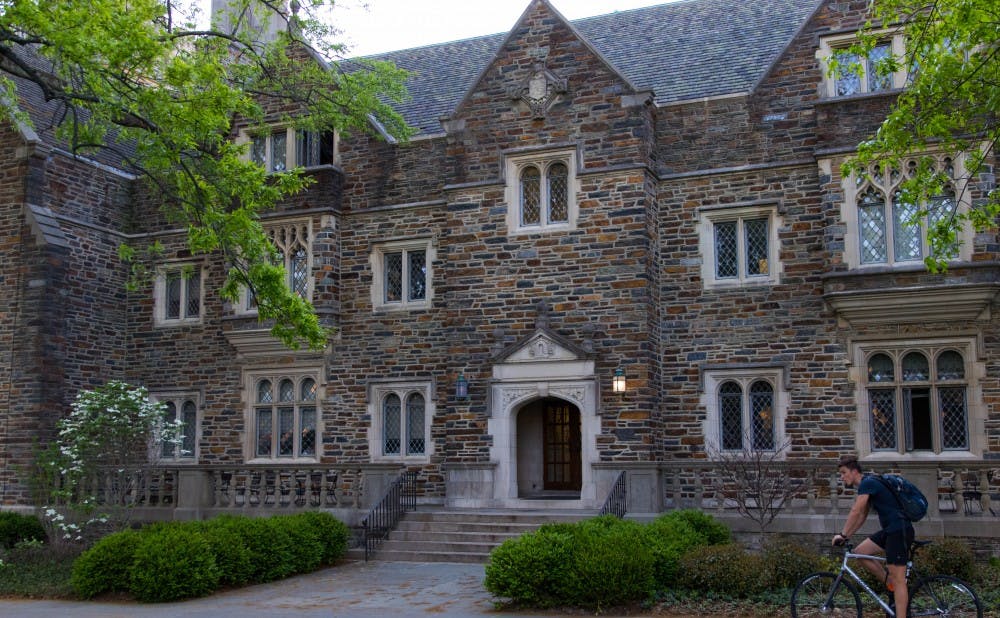Arts & Sciences Council got its first look at a draft proposal for the new Trinity College curriculum and heard a proposal for the Thompson Writing Program’s new minor in writing and rhetoric during a Thursday meeting.
Draft of a new Trinity curriculum
“Here’s the moment we’ve all been waiting for,” said Joshua Socolar, professor of physics and chair of the Council, of the curriculum draft proposal in his opening remarks.
Arts & Sciences Council has been discussing and providing feedback for the development of a new curriculum for Trinity College students since its first meeting of the academic year. This was the first time that the Trinity Curriculum Development Committee presented the Council with a full proposal.
The Council will provide feedback on the draft proposal in February, hear the final proposal from the TCDC in March and vote on the final curriculum proposal in April. The new curriculum is set to roll out in fall 2025, affecting the Classes of 2029 and beyond.
The draft of the new Trinity curriculum included significant changes to the current Areas of Knowledge and Modes of Inquiry requirements, as well as to the required courses for first-year students. Minor changes are also made to writing and foreign language requirements.
The proposed new curriculum would formally do away with both the six Modes of Inquiry and five Areas of Knowledge requirements, replacing these codes with six new categories. Students would have to complete two courses in each of these six categories in order to fulfill their graduation requirements.
The six new categories proposed by TCDC are Creating & Experiencing Arts (CE), Understanding Human Experience (HE), Exploring Civilizations & Cultures (CC), Social & Behavioral Analysis (SB), Quantitative & Computational Reasoning (QC) and Investigating the Natural World (NW).
These categories, while closely mirroring the five current Areas of Knowledge, do have one major difference: an increased emphasis on the arts and humanities in the undergraduate curriculum. The TCDC effectively split the current Arts, Literature & Performance requirement into two requirements — CE and HE – which will each require two courses to complete.
These six categories are meant to simplify the process of completing graduation requirements, avoid “gamification” of the system as much as possible and rectify inequities in how many various courses count toward a Trinity degree, according to Scott Huettel, professor of psychology and neuroscience and chair of the TCDC.
“We’re replacing puzzle pieces with building blocks,” he said, illustrating the TCDC’s goal of replacing a complicated, multi-part system with a simpler linear one.
For up to two of the six categories required under the new curriculum, students will be able to replace the two required courses with one “century course,” reducing the number of required courses from 12 to 10. Century courses will be designated by individual academic departments as particularly rich and relevant. The TCDC described century courses as the classes that Duke faculty would want students to take if they were only able to take one course in a particular subject area in their lives.
While century courses do allow students to reduce the number of courses needed to complete distributional requirements, Huettel believes that they prevent gamification of the system by incentivizing students to take particularly rich and engaging courses in the areas that they may not think that they are as interested in, instead of searching for the “easiest” courses to fill requirements.
The first-year experience also saw significant changes under this proposed new model. Currently, first-year students are required to take one first-year writing course and any one class designated as a seminar. Under the new model, first-year students would take sets of three connected courses that explore a topic from multiple perspectives.
These three connected courses would include two related courses, at least one of which must be taken in their first semester and at least one of which must involve small-group learning, as well as one first-year writing course that is thematically linked to the other two courses.
These courses would be “clustered” around themes decided by the faculty and would expose students to foundational knowledge, pushing them to examine societal impacts and consider ethical implications. Each chosen topic would have an estimated four to 10 courses associated with it, of which students would choose two along with the associated writing course.
One goal of this new first-year curriculum is to encourage the formation of “cohorts” among first-year students in order to ease their transition to college and facilitate the formation of friendships, said Huettel.
Foreign language requirements would remain largely the same, except that advanced students would no longer be able to satisfy their requirements by taking a single course at the 300-level. Under the new model, all students would be required to take at least two foreign language courses.
Minor in writing and rhetoric
The Thompson Writing program presented its proposal for a new minor in writing and rhetoric to the Council. The new minor aims to “cultivate understanding of and practice in the complexities of written, verbal and digital communication across contexts.”
Get The Chronicle straight to your inbox
Sign up for our weekly newsletter. Cancel at any time.
The minor, like most others at Duke, would require five courses, including at least one core Writing Studies course, at least three more courses originating in TWP and at most one TWP-approved elective course that originates from an academic department outside of TWP. At least three of the courses counted towards the minor must be writing intensive (W-coded).
“This is not a proposal for an opportunity for students to just collect more W-coded courses and then call it a minor in writing and rhetoric,” said TWP Director Denise Comer. She emphasized that the minor is an “intentional configuration of sets of courses” in the practice and theory of writing and rhetoric.
Currently, TWP offers nine courses besides the first-year Writing 101 course. A goal of the minor is to allow students to tailor their paths through the minor to their specific interests and goals.
In order to offer a wider range of courses for students related to the minor, TWP plans to design and implement 11 new courses over the next four semesters, resulting in seven to eight courses that are consistently offered each semester. The 15 regular-rank faculty members in the Writing Studies program are well-equipped both with the needed resources and the needed space in their teaching loads to realize this goal, Comer said.
The TWP electives that would count towards the minor include courses like Writing 384, Public Speaking: Policy Advocacy and Communication, Writing 275S, Cyber Connections: Communication in the Digital Age, and Writing 285S, African American Rhetorics and Writing Studies.
Comer said that implementing the minor would allow Duke to become a "trailblazer," joining a "national presence" of institutions with writing minors. However, the Massachusetts Institute of Technology is the only one of Duke’s peer institutions to offer such a credential.
Comer also addressed some concerns and frequently asked questions, emphasizing that data shows that implementing this new minor will not draw students away from adjacent minors such as the English minor and the journalism and media studies minor, or from W-coded courses in their respective majors. Comer added that the minor will not negatively impact staffing for Writing 101 courses, the department is confident that there is enough student demand to justify the minor and that TWP has all of the necessary human and monetary resources to implement the minor successfully.
The Council will vote to approve the new minor at their next meeting in February.

Holly Keegan is a Trinity junior and a senior editor of The Chronicle's 120th volume.

